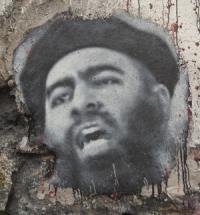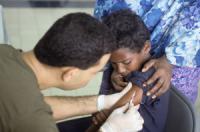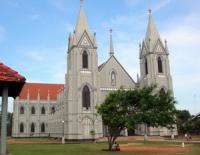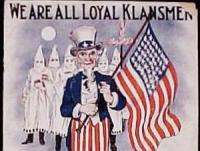-
Islamic State leader: Next chapter in IS’s campaign will be “war of attrition”

Islamic State leader Abu Bakr al-Baghdadi is showing his face for the first time in five years, appearing on a video posted to the internet Monday by the terror group. Baghdadi acknowledges the fall of the last IS-held territory in Baghuz, Syria, and describes the terror group’s fight now as a “battle of attrition.”
-
-
Sri Lanka bans face veils in wake of Easter terror attacks

Women in Sri Lanka will no longer be able to cover their faces under new emergency regulations which came into effect Monday. Sri Lanka issued the ban as part of a series of emergency measures enacted in the wake of the Easter Sunday suicide attacks.
-
-
Sri Lanka: Militant leader killed in Easter bombings
Sri Lankan Islamic militant leader Zahran Hashim was apparently killed in one of the suicide attacks on Easter, President Maithripala Sirisena said on Friday. Police are now hunting for 140 people with suspected “Islamic State” ties.
-
-
Islamist gunmen kill polio vaccinator in Pakistan

In Pakistan, a Islamist gunmen on Thursday shot dead a female polio vaccinator and wounded another. Conservative Islamic clerics – and the Taliban — have long been suspicious of the polio vaccine, claiming it is a Western plot to harm or sterilize Muslim children. The Pakistani authorities also arrested ten men in the provincial capital Peshawar for spreading unfounded rumors through fake social media videos that a polio vaccine had led to fainting and vomiting. In recent years, anti-vaccination agitators have killed dozens of people in Pakistan, one of three countries in the world — along with Afghanistan and Nigeria — where wild polio virus is still endemic.
-
-
New Zealand, France leading an effort to ban terrorists from social media
New Zealand and France will host a meeting with technology companies and world leaders to develop a strategy to block terrorists from social media. The meeting comes in the wake of the March shootings at two mosques in Christchurch.
-
-
White supremacists use social media aid, abet terror
Before carrying out mass shooting attacks in Pittsburgh and New Zealand, white supremacist terrorists Robert Bowers and Brenton Tarrant frequented fringe social networking sites which, according to a new study, serve as echo chambers for the most virulent forms of anti-Semitism and racism, and active recruiting grounds for potential terrorists.
-
-
IS claims responsibility for deadly Sri Lanka blasts
The Islamic State group said Tuesday, without providing evidence, that it was responsible for a series of blasts in Sri Lanka that killed more than 300 people and injured hundreds of others on Easter Sunday. Also Tuesday, Sri Lanka’s state minister of defense told parliament that those who carried out the attacks did so in retaliation for attacks at two mosques in Christchurch, New Zealand last month.
-
-
Sri Lanka attacks: government’s social media ban may hide the truth about what is happening
Sri Lanka has temporarily banned social media and messaging apps in the wake of the coordinated Easter Sunday attacks on churches and hotels across the country, which killed at least 290 people. The ban is ostensibly to stop the spread of misinformation – but in Sri Lanka Facebook and social media platforms generally have created a positive space for public conversation that did not exist before. Shutting down social media, leaving its citizens reliant on state messaging and a weak and beaten down form of journalism, the government now risks preventing Sri Lankans from finding out the truth about what is happening in their fragile and delicately balanced country.
-
-
Nearly 300 killed, 500 injured in Easter Sunday attacks on churches, hotels in Sri Lanka

In the worst wave of terrorist violence in Sri Lanka in ten years, a series of blasts on Sunday have hit churches and hotels in and near the Sri Lankan capital, Colombo. The nearly simultaneous blasts targeted churches during Easter services and hotels frequented by foreign guests. Sri Lankan officials said 290 people, including at least 27 foreigners, had been killed in the blasts in Colombo and elsewhere. More than 500 more have been injured.
-
-
Sri Lanka attacks among the deadliest terrorist attacks since 9/11
The Sunday attacks in Sri Lanka – nearly 300 killed and more than 500 injured — places the bombings on a par with other high-casualty terrorist atrocities since September 11, the single deadliest terrorist attack in history, in which 2,977 people were killed.
-
-
The first lone-wolf terrorist
Muharem Kurbegovic is considered the first “lone-wolf” terrorist. He was born in Sarajevo in 1943 and immigrated to the United States in 1967 to pursue a career in engineering. In 1973 he launched a series of bombing in and around Los Angeles. What especially alarmed the authorities was his interest in building chemical weapons, including nerve-gas munitions, to use in his planned attacks:
-
-
Analyzing lone-actor terrorism in context
Assessing and managing the risk of lone-actor terrorism is a challenge, as events around the world continue to show. Noémie Bouhana of the Department of Security and Crime Science at University College London suggests a shift in focus from “who and why” to “who and where.” This approach is captured in the S5 framework, which builds on the findings of PRIME, an international project led by Bouhana and funded by the European Commission to understand and counter lone-actor terrorism.
-
-
UN calls for repatriation of IS wives, children in Syria
The U.N. Office for the Coordination of Humanitarian Affairs (OCHA) is calling on countries to repatriate thousands of wives and children of Islamic State militants in Syria, who are living in dire conditions in the al-Hol camp in al-Hasakeh governorate in northeast Syria.
-
-
Exposure to mass violence on the media leads to cycle of distress
The more people watch, listen or scroll through hours of news coverage of events such as terrorist attacks, the more likely they are to develop stress symptoms that in turn increase their media consumption during the next mass violence event, according to a nationwide study.
-
-
Social media networks aid, abet white supremacist terrorism: Study

A new study reveals how fringe social media sites such as Gab, 4 Chan and 8chan act like virtual “round-the-clock white supremacist rallies” where hateful notions of Jews and other minorities are openly espoused and closely associated with violence as a solution.
-
- All
- Regional
- Water
- Biometrics
- Borders/Immig
- Business
- Cybersecurity
- Detection
- Disasters
- Government
- Infrastructure
- International
- Public health
- Public Safety
- Communication interoperabillity
- Emergency services
- Emergency medical services
- Fire
- First response
- IEDs
- Law Enforcement
- Law Enforcement Technology
- Military technology
- Nonlethal weapons
- Nuclear weapons
- Personal protection equipment
- Police
- Notification /alert systems
- Situational awareness
- Weapons systems
- Sci-Tech
- Sector Reports
- Surveillance
- Transportation
Advertising & Marketing: advertise@newswirepubs.com
Editorial: editor@newswirepubs.com
General: info@newswirepubs.com
2010-2011 © News Wire Publications, LLC News Wire Publications, LLC
220 Old Country Road | Suite 200 | Mineola | New York | 11501
Permissions and Policies
Editorial: editor@newswirepubs.com
General: info@newswirepubs.com
2010-2011 © News Wire Publications, LLC News Wire Publications, LLC
220 Old Country Road | Suite 200 | Mineola | New York | 11501
Permissions and Policies
